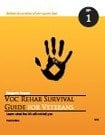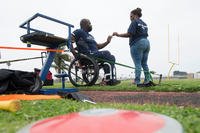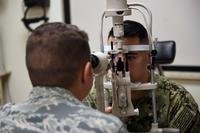Here’s a continuance of my own little story for service connection for the following: Sleep Apnea secondary to Sinusitis and Allergic Rhinitis. I was denied for these conditions right after my separation from service, in 2001.
A little background. I had a sleep study in service conducted by the Fargo VA. The VA had the records of a sleep study and was notified as such. Yet, during my evaluation, the VA did not request its own files and subsequently denied my condition. I had brief episodes of apnea but did not require a machine. They also denied service connection for the other conditions despite at least 12 instances within my service records requiring treatment. The effects of sinusitis were later confirmed in 2009 via an MRI as were the polyps from allergic rhinitis. The next year I was given a CPAP machine.
Rubber, meet Road. In 2010, I put the whole claim together with a little documentation help from law school and “The Little Book on Legal Writing.” To see what I mean, here are the first couple pages of my claim. I called the Fargo VA for the actual sleep study from 1998. While on the phone, the FOIA guy at the VA faxed the records to me after a little convincing (that was the morning of my recent VA examination – don’t wait to the last second like I did). The records verified my apnea. I was also able to find Congressional Reports about the conditions of the dormitories we lived in while at tech school – there were issues of asbestos and leaking sewage along with outdated HVAC systems blowing particles around. I immediately came down with sinusitis and pneumonia after arrival. I included this documentation in the event that I come down with certain cancers down the road.
Armed with the report, my medical records and a typed summary, I went to the exam. The first appointment was with an Ear Nose and Throat doctor. He said the VA already conceded service connection but he needed to find out how many episodes I have every year. I handed him my documentation. While he did not read over the documentation in full, he most likely referred to it after the meeting while filling out his exam notes. This is key, especially if the examiner did not take good notes while in the meeting or forgot some key point that you mention. The summary you hand him may be the difference between a 10 or 30 percent.
My second evaluation was for sleep apnea. I showed the doctor my current diagnosis along with the former diagnosis while I was in service. She took the time to read over my summary, which explained how the VA missed my earlier diagnosis. Since I had the old sleep study exam with me, she was able to clearly tell that I had sleep apnea while in service. Because of the way my documentation was set out, she told me on the spot that she was going to tell the VA I had sleep apnea in 1998. This could result in a decision for retroactive pay if I can prove VA committed a Clear and Unmistakable Error during their 2001 denial.
For you. After you file your claim,VA will send a letter verifying receipt of your claim and notifying you of the information they need. This will include release forms they will need you to fill out in order to request files from civilian doctors you have seen. Be sure to read everything very carefully. Sometimes the dates can be wrong or VA might be asking for the wrong information. In addition, you may have better luck getting documents from doctors than will the VA. When you forward medical release letters to civilian medical providers for their records, be sure to follow up with a phone call to ensure they understand what you are requesting, especially for psychologists. Leave nothing to chance and never expect the VA will figure out how to contact these people for you.
At the examination for conditions like PTSD, VA has examination criteria online. Google whatever condition to read about the experience of other veterans after their exams. This can help a lot. First, it will help you frame your condition in terms that the VA examiner will use in their analysis of your condition. Second, it will help you think through relevant dates and issues prior to the evaluation. This increases your credibility factor with the examiner.
Lastly, write a one or two page summary about your condition. Click here to view my own example. Use bullet points with brief explanations of each and every treatment for that particular condition. Be careful to not overwhelm your examiner. Ask if the examiner has viewed your C-File before the exam. If not, you may have a claim for a review if the examiner gives you and adverse finding. If the C-File is not present for the exam, be sure to note the fact. A lack of C-File can bias your exam and be cause for a new one if you do not get the results you think you deserve.
In closing, be patient. The whole process can take up to one year or longer. So, do not expect the cash to start flowing in quick enough to pay next month's rent. Next week is the last Proven Tips, where I will discuss VA grants and denials.
# # # # #
 Benjamin Krause is an award winning investigative journalist, attorney, and disabled veteran of the US Air Force, where he served in its Special Operations Command. He wrote his guide, the Voc Rehab Survival Guide for Veterans, after winning his long fight for benefits against VA to help other veterans do the same. Benjamin is a graduate of Northwestern University and the University of Minnesota Law School using VA Vocational Rehabilitation.
Benjamin Krause is an award winning investigative journalist, attorney, and disabled veteran of the US Air Force, where he served in its Special Operations Command. He wrote his guide, the Voc Rehab Survival Guide for Veterans, after winning his long fight for benefits against VA to help other veterans do the same. Benjamin is a graduate of Northwestern University and the University of Minnesota Law School using VA Vocational Rehabilitation.



